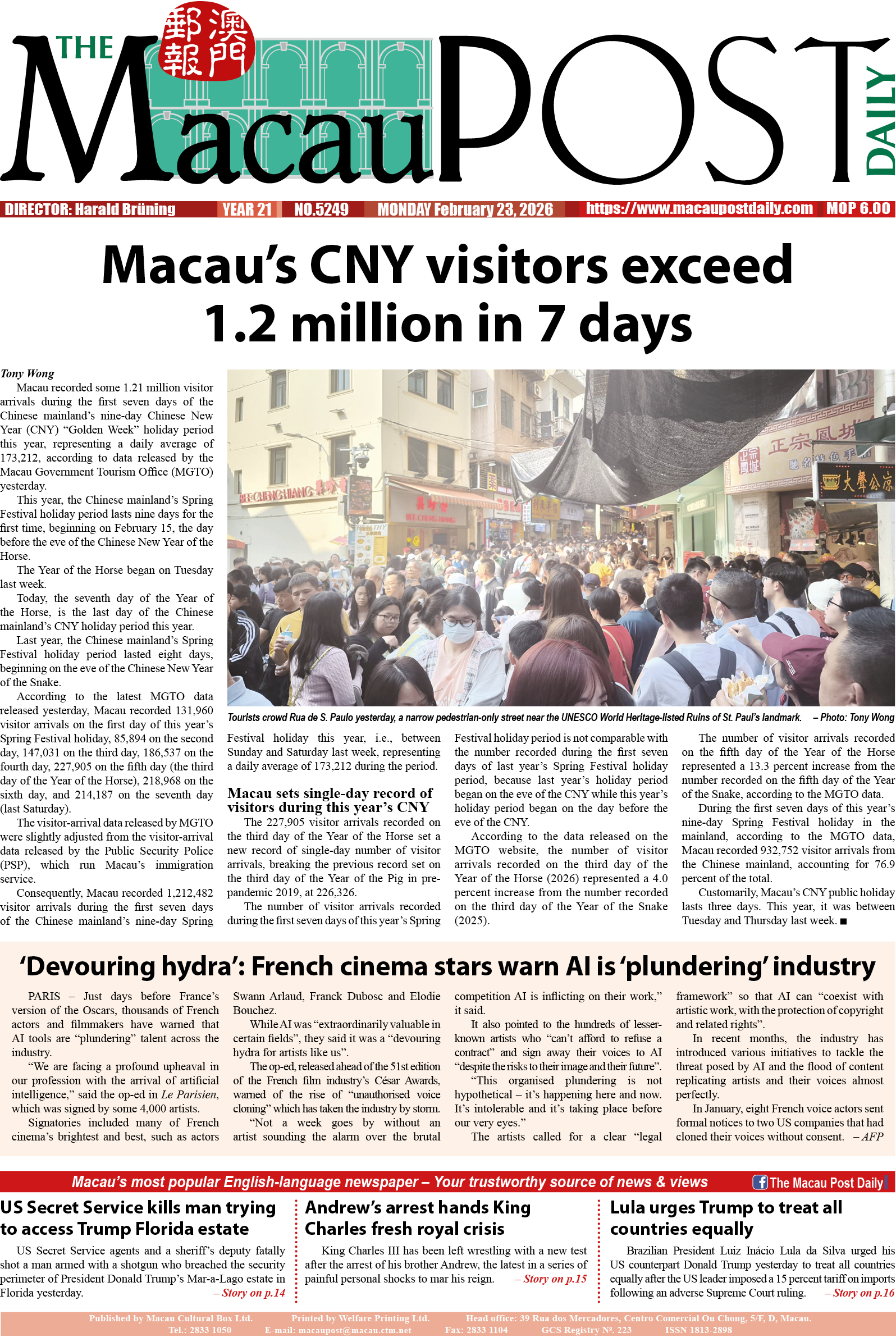Three locals and three mainlanders were asked by The Macau Post Daily yesterday in the city centre about their views on the upcoming mutual recognition of driving licences between the mainland and Macau, with all local interviewees saying that the measure makes it convenient for locals to drive in the mainland as they do not have to take a driving test once the measure takes effect, while all the mainland interviewees said they believed that the measure would better facilitate communication between both sides’ residents.
The local government announced on Monday that a framework agreement on the Reciprocal Recognition of Drivers’ Licences for Exchange Purposes was signed with the Public Security Ministry last Wednesday and is slated to take effect on May 16, when local driving licence holders can obtain a mainland driving licence without taking a driving test, while all mainland drivers will be able to drive a car in Macau for 14 days, or for a year after registering with the Public Security Police (PSP) Traffic Department. However, they cannot drive their mainland-registered car in Macau.
‘Different driving habits’
Fong, a local woman in her twenties, expressed concerns about the different driving habits on both sides of the border: “There are too many accidents caused by dangerous driving in the mainland even though they are under scrutiny by CCTV camera systems”, claiming that most mainlanders “always take the opportunity” to drive at high speed, which is dangerous in Macau, a place that “is small and crowded”. Fong, who has a local driving licence, said that she will obtain a mainland one only if necessary as she seldom travels to the mainland, but she pointed out that the new measure will allow locals to drive to their hometowns. Fong asked rhetorically: “How is it possible for mainlanders to drive for 14 days in Macau?”
‘Traffic becoming dangerous’
Lei, who works on construction projects, said that the upcoming measure will benefit and facilitate locals travelling to the mainland without the need to take public transport, especially for those who have relatives there, but he was quick to add: “On the other side, Macau’s traffic conditions will become dangerous in the future when mainlanders are able to drive in Macau.” Lei said that based on his own experience, compared to local drivers, mainlanders were “quite aggressive” when driving. Lei, who holds a local driving licence, also said that he “was not in a hurry” to obtain a mainland driving licence, adding that his first stop for a road trip would eventually be Guangzhou.
‘Years of driving experience’
Ho, a male university student, said that he did not worry about the different driving habits of both sides, adding: “Although Macau’s roads are crowded compared to the mainland, it will not be a problem for them [mainland drivers] as they are used to driving in the mainland and have years of driving experience.” Ho pointed out that in taking advantage of the mutual recognition of driving licences between the mainland and Macau, he was planning a road trip to the neighbouring areas, such as Zhongshan and Guangzhou.
Mainlanders say measure facilitates cross-border communication
Two female mainland tourists together told The Macau Post Daily in the Ruins of St Paul’s area they believed that the mutual recognition of driving licences between the mainland and Macau could promote communication between the two sides and that many more mainlanders would “definitely” choose to travel Macau. When asked whether they would worry about the different driving habits in Macau and the mainland, they said there would be a little bit [of a worry], because when they first came here, they didn’t know which side of the road vehicles would be on when crossing the road. Looking left and then right is one of the problems, they said, adding that they didn’t know much about traffic rules here. They were quick to add they believed that once the measure takes effect, the government should set up guidelines and tutorials for mainland drivers. Consequently, both said, they did not think it would be a big problem for either mainland or Macau drivers because the roads and traffic signs on both sides were almost the same. They also said that although they still did not have a driving licence, they would like to drive in Macau on a future trip.
‘Better to walk around’
Zhou, a male university student from the mainland, said that the upcoming measure is a good way to promote the development of both Macau and the mainland, which “can better facilitate” cultural and economic connections between the two sides, adding: “That is to say, for us [mainlanders], we also want to come to Macau, to have fun, and to experience the local customs.” Zhou, who has a driving licence, said that he didn’t plan to drive in Macau, adding: “I think it’s better to walk around to see Macau.” Zhou pointed out that although driving habits of mainland and local drivers are different, with the former used to driving on the left and the latter on the right, their driving habits could be adjusted.
A Guangdong-Macau dual licence plate car crosses Macau’s Barrier Gate checkpoint en route to Zhuhai on Monday.
– Photo: Maria Cheang Ut Meng






